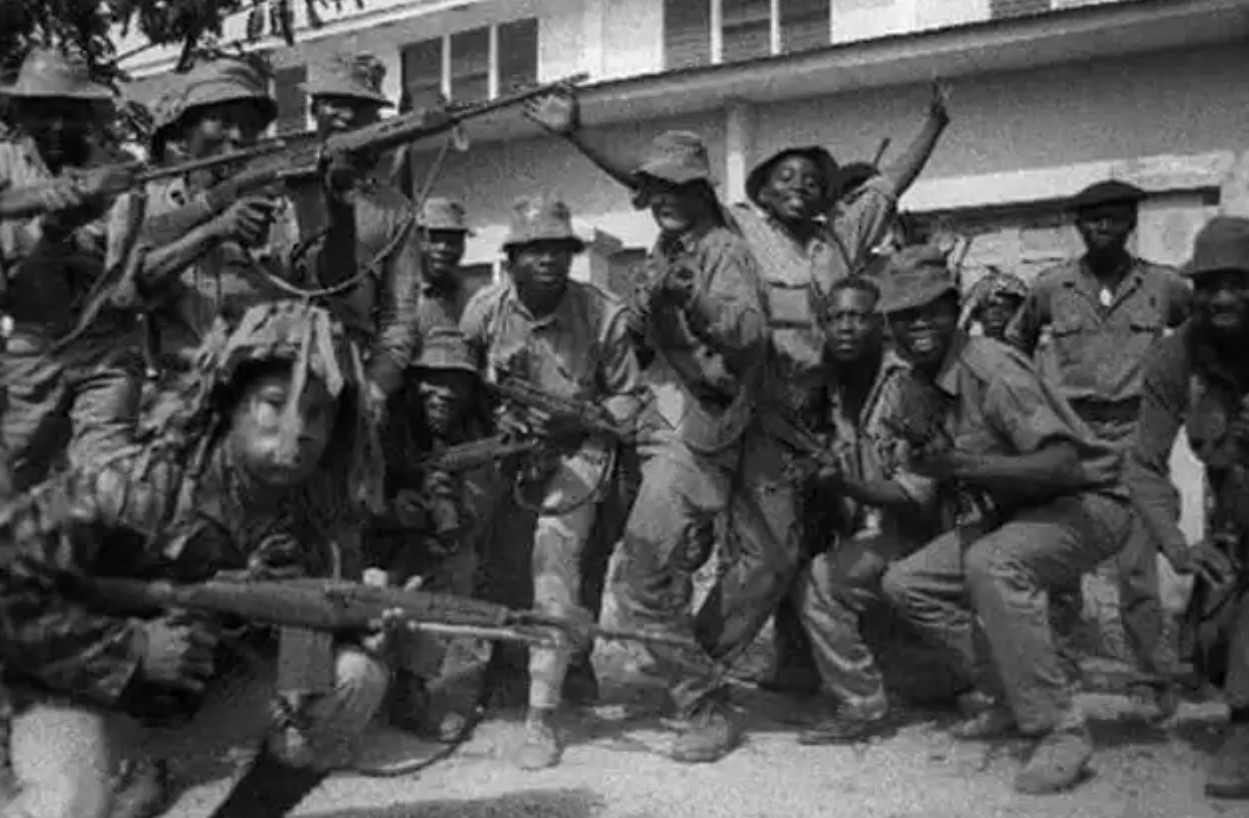The Nigerian Civil War, also known as the Biafran War or the Nigerian-Biafran War, broke out between the Federal Republic of Nigeria and the secessionist state of Biafra from July 6 1967 to January 15 1970. Nigeria’s main reason for going to war was to counter the secession of the Eastern Region (Biafra) from the Republic of Nigeria…Click Here To Continue Reading>> …Click Here To Continue Reading>>
The Igbo people of the Eastern Region felt they could no longer tolerate the Hausa-Fulani-dominated federal government and saw secession as the only way out. It was a three-year bloody war with a death toll numbering more than one million people, children included.
Immediate Causes of the Nigerian Civil War
1. The first military coup of Jan. 15 1966, led by Major Kaduna Nzeogwu, was seen as an Igbo coup by the Northerners. Prominent Northern leaders like Prime Minister Abubakar Tafawa Balewa, Alhaji Ahmadu Bello (Premier of the Nothern Region) and his wife, Hafsatu Bello, were killed in the coup while some Igbo leaders were spared. After the coup, General Johnson Aguiyi-Ironsi, an Igbo officer, was installed as the Head of State. This angered Northerners who sensed foul play. They prepared for retaliation.

2. The 1966 counter-coup. This was the second coup in Nigeria. On July 29 1966, some Northern military officers led by Lt. Colonel Murtala Muhammed staged a coup which was a retaliation to the killings of Northern politicians and officers by January 15, 1966 coup plotters. This coup brought General Yakubu Gowon, a Northerner to power. The North successfully reclaimed power.
3. The third immediate cause of the Nigerian civil war was the massacre of Igbos living in the northern part of Nigeria. After the first and second coup which was seen as ethnic strife, tension began to rise amongst Igbos in Northern Nigeria. This tension culminated in the pogroms targeted at Igbos. Between June and October 1966, pogroms in the North killed an estimated 8,000 to 30,000 Igbos, half of them children, and caused more than a million to flee to the Eastern Region.
4. In May 1967, to strengthen the unity of the country, the Federal Military Government of Yakubu Gowon divided Nigeria’s four regions into twelve states. The former Eastern region under Lt. Col. Chukwuemeka Ojukwu saw the state creation (without consultation) as the last straw. And so, on the 30th of May, 1967, Lt. Col. Ojukwu declared the existence and independence of the Biafra Republic.
The outbreak of the Nigerian Civil War
The Federal Military Government condemned Ojukwu’s action and ordered that the secession of the Eastern Region as Biafra should be countered. On the 6th of July, 1976, the Nigerian federal troops marched in two divisions into Biafra. Division 1, led by Col. Shuwa operated through the north of Biafra, while the second Division advanced on Nsukka which was captured on July 14 1966.

On the 9th of July, the Biafran army retaliated by attacking the mid-western region of Nigeria. They marched across the Niger River, passed through Benin city and later stopped at Ore on August 21. This attack was led by Lt. Col. Banjo, a Yoruba, with the Biafran rank of brigadier. The Biafran troops captured the mid-west after a little resistance from soldiers stationed in the region.
This infuriated Gowon and commanded Col. Muhammad Murtala to form another division (Division 2) to drive the Biafran army out of the mid-west and attack Biafra afterwards. The mid-west region was recaptured by the Nigerian army on the 20th of September. READ FULL STORY HERE>>>CLICK HERE TO CONTINUE READING>>>
Enugu was made the capital of the Republic of Biafra. Later when Enugu was captured by Federal troops in October 1967, Aba, Umuahia and Owerri successively served as the provisional capitals of the Republic.

Within a year, the Federal Military Government (FMG) captured the city of Port Harcourt and many other coastal oil facilities. The Federal Military Government blocked all the routes for transporting food into the Republic of Biafra which led to the starvation and death of over 2 million Biafrans.
The FMG saw food blockade as a war strategy while many people around the world tagged it a genocide. The food flown into Biafra by foreign mercenary pilots was little and couldn’t solve the starvation Biafra faced. One of the notable mercenaries was the Swedish Carl Gustav Von Rosen who attacked Nigerian military airfields in Port Harcourt, Benin City and Enugu.
End of the Nigerian Civil War/Biafran War
The FMG attacked Biafrans through air, land and sea, leaving them helpless at some point. By the end of 1969, it was obvious that the Nigerian civil war will soon come to an end.

The FMG launched its final operation known as “Operation Tail-Wind” on January 7, 1970. The operation was executed by the 3rd Marine Commando Division and supported by the 1st and 2nd Infantry division. Owerri was captured on the 9th of January, while Uli fell on the 11th of that same January.
The self-acclaimed head of state of Biafra, Lt. Col. Chukwuemeka Odumegwu Ojukwu, aware of the situation, fled the Republic with his family on the 8th of January, 1970. Philip Effiong, Ojukwu’s deputy who was left with the administration of Biafra later surrendered to the Federal Government on the 14th of January, 1970, therefore, bringing the Nigerian civil war to an end. Philip Effiong signed the surrender paper in Lagos and the Nigerian civil war officially ended on the 15th of January, 1970.
After the war, General Yakubu Gowon said, “The tragic chapter of violence is just ended. We are at the dawn of national reconciliation. Once again we have an opportunity to build a new nation. My dear compatriots, we must pay homage to the fallen, to the heroes who have made the supreme sacrifice that we may be able to build a nation, great in justice, fair trade, and industry.”
Thanks for reading, SOURCE


















